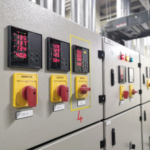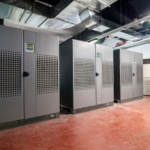The purpose of an uninterruptible power supply (UPS) is to keep critical and noncritical equipment constantly powered by a flow of electricity even if the main power supply goes down. Having a UPS in place is critical for any company or individual who has extensive electronic equipment and cannot afford a moment of downtime.
What Can Cause UPS Failure?
A UPS typically provides up to 20 minutes of backup power. In other words, UPS is not intended to keep your computer equipment running during a blackout, but it does give you the opportunity to safely save whatever you are working on and properly shut everything down. Unfortunately, the battery will not retain a charge forever, and there are many mistakes that can erode the lifespan and functionality of your UPS.
A common, and highly avoidable cause of UPS failure is temperature. A UPS will become less effective if you use or store it in an area that is warmer than 77°F. Shockingly, a 15° increase will cut your battery’s expected life in half, so it is critical to use proper ventilation. Other issues that could cause your UPS battery to fail when you need it the most include:
- Improper use of the battery
- Over-cycling by going through too many recharge and discharge cycles
- Leaving the battery in storage for an extended period of time without charging the battery
- Using the wrong float voltage.
What Problems Will UPS Failure Cause?
If the power goes out and your UPS battery is dead, you could end up dealing with a long list of complications. The most common issue is lost data, but an unexpected power surge could also damage the power supply of any sensitive electronics. Additionally, overvoltage issues can quickly cause extensive damage to the CPU and a variety of other essential parts. This means that you need to place an emphasis on keeping your UPS battery properly charged and operational if you want to avoid any costly problems as the result of a power outage or surge.
How Long Should a UPS Battery Last?
Although there are variances by brand and type, it is common to receive five years of optimal performance from a UPS battery as long as you avoid making the common mistakes detailed above. As an added bonus, the battery should still be at least 80 percent effective at the five-year mark. However, most of these batteries will begin to erode very quickly after this point. Therefore it is best to keep a log of your UPS batteries so that you can be diligent about replacing them at least once every five years. Keep in mind that some UPS batteries are only designed for a three-year lifespan, and even one unfavorable condition such as using them in the wrong temperature could end up reducing their usability to only 1.5 years.
UPS will help keep your electronics secure from many issues, including a power failure, frequency differences and voltage spikes, surges and sags. There are two main types of UPS systems available, standby UPS and continuous UPS, but the standby option is the most cost-effective. Regardless of which system you select, make sure that you steer clear of avoidable issues such as improper storage so that you can get the most out of your investment and provide the highest level of protection for your electronics.





